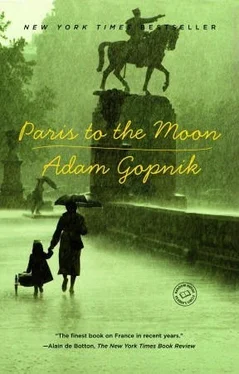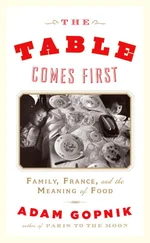The motorcyclists have solved the traffic problem by giving up the streets and simply driving on the sidewalks. As you stroll along the boulevard, you suddenly discover a Harley-Davidson bearing down on you at high speed from among the plane trees. The motorcyclists, who would rather run over a few pedestrians than give up their Hogs, are more truly Parisian than the wan inline skaters, since the French attitude toward any crisis is not to soldier through it but just to pretend that it isn’t happening. (It was in Paris, after all, that Picasso and Sartre sat in a café for four years pretending that the Germans weren’t there.)
A deeper and more dramatic version of this national habit of pretending that things haven’t happened is what has shaped the strike. What the French strikers want to ignore, at least according to their critics, are the economic facts of the end of the twentieth century: “global capital,” the “modern service-based economy,” the “tough new competitive conditions of the twenty-first century,” all of which, the critics say, can be dealt with only by a more “flexible” labor market. When are these people going to grow up and face reality? seems to be the exasperated question that others in Europe are asking. What the French feel is that for the past half century they have done pretty well by not facing reality—or, anyway, by facing it for one moment and then turning their backs on it for another, in a kind of endless inspired whirl through history. France is a uniquely lovely and supple place to live, and there is a reasonable suspicion here that the British and the Americans and the Germans are trying to hustle the French into what is called a liberal paradise, but what no one here is quite convinced is so paradisiacal. Among the nonunionized, petit bourgeois strike sympathizers, in particular, there is an intransigent and rather admirable level of temperamental resistance to the notion of “reforming” France to suit the global economy. Even Bernard Thibault, the secretary-general of the chemmots’ union, said not long ago that he was willing to negotiate but that his bottom line was “Citizens must never be transported like merchandise.”
In France, of course, not even the merchandise is transported like merchandise. When the turkey arrived at last, a week after the strike began, I got an excited call inviting me to come see it, and when I arrived, the rotisseur, showing it off, pointed out to me how different it was from any bird in an American supermarket. It wasn’t frozen, pumped full of cooking oil, or raised in a shed. The bird was supposed to have composed what amounted to a suicide note. “I was raised like a savage, in the forest of the Landes,” the turkey’s last will and testament began. “I fed on pure corn, wandered in the open air, and slept at night alone in the trees….”
We talked about the strike—the rotisseur seemed to have the same ambivalent sympathies as most other Frenchmen—and I sensed then that he believed that somehow the cheminots’ strike would help him keep out the frozen turkeys, and the supermarkets they sit in, and the big chains that own the supermarkets. This belief may be as false as the belief that a ghost dance could raise the dead and bring back the buffalo, but it is no less fervently held.
The only things that have been working perfectly during the strike are what I suppose have to be called the instruments of global capitalism. The worldwide courier services are still picking up packages and sending them out overnight across the ocean, faxes buzz and communicate, and the one worker who seemed to make it nonchalantly through the streets to our house was the cable TV installer, who hooked us up so that we could watch the strike on CNN. It’s that anxious-making globalized economy that the strikers are responding to, however incoherently.
Everyone here likes to compare what is going on now with what went on in ’68. The real point may be that while that was, in retrospect, essentially a cultural revolution in the guise of a political one, ’95 seems, so far, to be a political revolution in the form of a cultural ritual-the big student-and-worker strike-that isn’t really appropriate for it. It isn’t appropriate because a strike by its nature, is unpredictably disruptive, while the emotions behind this one are deeply conservative. The strike is one more cry of the heart from people who felt blessed for a long time and now feel threatened. The turkey, not quite incidentally, was so much better than any other turkey I have ever eaten that it might have been an entirely different kind of bird.
The Winter Circus, Cristmas Journal 1
It is the weather reports on CNN that will scare you most. They must come from a studio in Atlanta, like most things on the cable network, but they tell about the European weather, and only the European weather, and they treat Europe as if it were, for CNN’s purposes, one solid block of air with dirt down beneath, one continuous area of high- and low-pressure systems bumping into one another over a happy common land, just like the Instate area, or “here in the Southland,” or “up in the heart of the North country,” or any of the other cheerful areas into which American television stations divide the country.
The job of the European weatherman (or -woman) seems to be pretty low on the CNN totem pole. They keep changing. One day it is a blow-dried midwesterner; the next a corn-fed, nicely Jane Pauleyish woman; the next a portly black guy. Each one points in turn to the big map of Europe, with the swirling satellite photo superimposed, and then, with the limitless cheeriness of an American announcer, calls out the temperature and tomorrow’s forecast for every site of the more intolerable tragedies of the twentieth century.
“If you’re headed to Warsaw tonight, you may just want to pack that extra sweater, but if business is pulling you over on that quick trip to St. Petersburg”—quick, impish, professional wink—“you’d better make sure that you’ve got the overcoat. Looking at snow there all night long.
“We’re looking at sunny weather throughout Italy, from Rome right up to Venice. Looks like another mild night in France, though of course there’ll be snow in the mountains around Savoy. In the Basque country, some really chilly temperatures. Nice skiing, though. More mild weather in Prague and Budapest, though looking up at Vienna…” All the old capitals of Old Europe, the sites of the ghettoes and the massacres and the opera houses, the border with Spain where they turned the refugees away and Walter Benjamin died in despair, all treated in the spirit, with the same sound, that I can recall from every night in my childhood in West Philadelphia, when “Dr.” Somebody or other—a “certified meteorologist”—gave the weather for the tristate area and threw in the highs and lows in Atlantic City “for all of you heading for the shore.”
We have won as large a victory as any country has ever won—no empire has ever stood in so much power, cultural, political, economic, military—and all we can do is smile and say that you might want to pack a sweater for the imperial parade.
When the cable television man came to hook us up on the first morning of the general strike, you could hear the demonstrators out on the boulevard, singing and marching. But the bland emissary from the age of global information worked on, stringing the wire and hooking up the decoder boxes. He finally handed us three different remotes and then ran through the thirty-odd channels like a priest reciting the catechism. “Here is CNN, news in America. Here is MTV. Here is French MTV,” the cable man explained. “Here is Euronews, in English. Here is Euro-sport.” A 49ers-Dolphins game was in progress. There it was, truly, the same familiar ribbon of information and entertainment that girdles the world now—literally (really, truly literally) encircling the atmosphere, electric rain. All you have to do is hold out a hand to catch it.
Читать дальше












